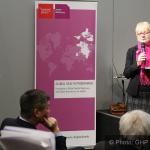The recent Ebola outbreak in Western Africa has had serious implications for human security and economic development in the affected countries. It has also raised concern about political stability in countries that have been severely affected by civil war. Delayed and disorganized initial attempts to contain the quickly emerging epidemic, and fears of further spill-over across and beyond the countries concerned as well as the African continent made it abundantly clear that more effective approaches are needed to both prevent and manage such global health crises.
The economic, security and humanitarian dimensions of such a health crisis call for action in different sectors and at several levels, global, regional, national and local. This includes financial investment and support to provide emergency health care as well as public health measures to contain the spread of the disease; diplomatic and political efforts to prevent potential political instability and to build trust; and efforts to help affected populations cope with the crisis and its aftermath and recover from the suffering and the social and economic impact it has caused. It will be critical to put in place structures and institutions to prevent future crises of similar magnitude in the countries concerned - but also to learn from this initially “disastrously inadequate response” how to build preparedness and response mechanisms at the global level that stand ready to support countries in the event of a major disease outbreak.
The challenges that emerged to assist affected nations in managing and containing the Ebola outbreak raise the question as to which contributions security institutions can and should make to manage global health crises. How can benefits of security sector involvement in health crises be maximized and disadvantages minimized? What are the structural deficiencies of existing crisis preparedness and response mechanisms? What are the governance challenges at the national and international level, including the role of national security institutions, regional economic and security arrangements, and the United Nations System?
The public event will address these issues with engaged academics, policy makers and international organisations, including participants from West Africa. It will discuss lessons learnt and experiences from Ebola and previous global health crises, in order to put forward recommendations directed at the health, the humanitarian and the security sector communities. Therefore, the event will bridge and bring these perspectives closer together, potentially providing a more coherent, cross-sectorial approach to this global challenge.
The event is sponsored by the Swiss Armed Forces and the Swiss Federal Department of Foreign Affairs. Organised by the Global Health Programme, the Graduate Institute and the Geneva Centre for the Democratic Control of Armed Forces
Event materials
Background documents
-
Current context and challenges; stopping the epidemic; and preparedness in non-affected countries and regionsEBSS/3/2, WHO Executive Board Special Session on Ebola
-
Ebola - Security Threat or Public Health Threat?Yuchen Richard Wang, The Diplomacist, 29 October 2014
-
Ensuring WHO’s capacity to prepare for and respond to future large-scale and sustained outbreaks and emergenciesEBSS/3/3, WHO Executive Board Special Session on Ebola
-
From Conflict to Pandemics. Three Papers from the CSIS Global Health and Security Working GroupA Report of the CSIS Global Health Policy Center, May 2010
-
Global Health Security Agenda. Toward a World Safe and Secure from Infectious Disease Threats2014
-
Health and Security in Foreign PolicyRebecca Katz and Daniel A. Singer, Bulletin of the World Health Organization, 2007, Vol. 85, n.3, p.233-234
-
IHR and EbolaEBSS/3/INF./4, WHO Executive Board Special Session on Ebola
-
International Health RegulationsWorld Health Organization, 2005
-
Making a Difference. The Global Ebola Response: Outlook 2015Report from the UN Mission for Ebola Emergency Response, January 2015
Videos
Theodor H. Winkler, Ambassador and Director, Geneva Centre for the Democratic Control of Armed Forces (DCAF)
Ilona Kickbusch, Director, Global Health Programme, the Graduate Institute
Excerpt from speech Yvette Stevens, Ambassador and Permanent Representative, Permanent Mission of the Republic of Sierra Leone to the United Nations Office and other international organizations in Geneva
Excerpt from speech Robert Wah, President, American Medical Association
Excerpt from speech James Orbinski, CIGI Research Chair in Global Health, Balsillie School of International Affairs; Professor, Wilfrid Laurier University
Excerpt from speech Martin Schneider, Ebola Focal Point,International Committee of the Red Cross (ICRC)
Excerpt from speech Lamine Cissé, General; Chairman of the Board, Partners - West Africa for Civic Collaboration and Democratic Change; Former Chief of Staff of the Senegalese Armed Forces and Minister of Interior of Senegal
Excerpt from speech Ruth Caesar, National Focal Point, Mano River Women’s Peace Network (MARWOPNET); Chairperson, Women of Liberia Political Forum




